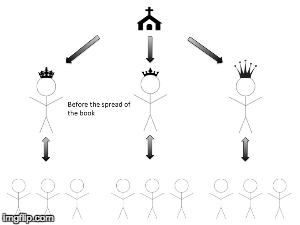Deep Horizontal Comradeship
Benedict Anderson’s “Deep Horizontal Comradeship” Illustrated through GIF
All quotes are from Benedict Anderson’s “Imagined Communities: Reflections on the Origin and Spread of Nationalism”.
“[T]he literati were adepts, strategic strata in a cosmological hierarchy of which the apex was divine. The fundamental conceptions about ‘social groups’ were centripetal and hierarchical, rather than boundary-oriented and horizontal… [T]he bilingual intelligentsia, by mediating between vernacular and Latin, mediated between earth and heaven” (Anderson, 15-16).
The creation of the printing press brought about the “slow, uneven decline of these interlinked certainties” and “drove a harsh wedge between cosmology and history” (36).
With a growing uncertainty about the divine and the pre-existing social structure, “the search was on, so to speak, for a new way of linking fraternity, power and time meaningfully together” (36). The spread of the book in common (non-Latin) languages brought about a new era of “print-capitalism, which made it possible for rapidly growing numbers of people to think about themselves, and to relate themselves to others, in profoundly new ways” (36).
“The lexicographic revolution in Europe…created, and gradually spread, the conviction that languages (in Europe at least) were, so to speak, the personal property of quite specific groups— their daily speakers and readers— and moreover that these groups, imagined as communities, were entitled to their autonomous place in a fraternity of equals” (84).
The result of greater understanding among equals due to increased communication is what Anderson refers to as deep horizontal comradeship: “[the nation] is imagined as a community, because, regardless of the actual inequality and exploitation that may prevail in each, the nation is always conceived as a deep, horizontal comradeship. Ultimately it is this fraternity that makes it possible, over the past two centuries, for so many millions of people, not so much to kill, as willingly to die for such limited imaginings” (7).
Anderson, Benedict. Imagined Communities: Reflections on the Origin and Spread of Nationalism. London ; New York: Verso, 2006. Print.
